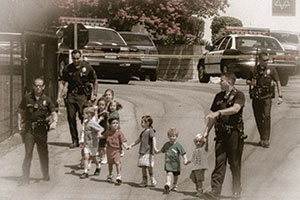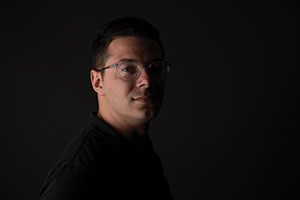Traumatic Effect
After surviving a hate-fueled shooting spree as a child, a psychology graduate student reflects on the complexities of recovery
The North Valley Jewish Community Center was six-year-old Josh Stepakoff’s safe place.
It was where he spent five days a week playing with other children enrolled in the same day camp program. It was where, for as long as he could remember, the day would begin with his father dropping him off and lead to a game of capture the flag with friends that felt like family.
 But his life was permanently changed on August 10, 1999, when a known neo-Nazi entered
the facility and fired 70 gunshots as “a wake-up call to America to kill Jews.” In
less than one minute, two bullets had pierced through Stepakoff’s hip and leg, barely
missing his spine and vital organs and reshaping his sense of security forever.
But his life was permanently changed on August 10, 1999, when a known neo-Nazi entered
the facility and fired 70 gunshots as “a wake-up call to America to kill Jews.” In
less than one minute, two bullets had pierced through Stepakoff’s hip and leg, barely
missing his spine and vital organs and reshaping his sense of security forever.
Stepakoff recalls about the center prior to the incident. “For this shooting to happen in my happy place, where I was safe and around people I loved—that threw me for a loop. To this day there’s no place where I truly feel safe.”
Now pursuing a clinical psychology degree at the Graduate School of Education and Psychology (GSEP), Stepakoff explains that while the details of the incident remained at the top of national news headlines for a short time, his personal recovery would require more than a decade of sessions with therapists and psychologists, as well as a brief period of psychiatric treatment.
The immediate symptoms of his diagnosed post-traumatic stress disorder were triggered by any sight or sound related to law enforcement and emergency first responders. With his sense of security completely lost, the sound of helicopter blades, police and ambulance sirens, or loud noises in general would stir the young Stepakoff into a massive panic attack. At home, his triggers would push him to make sure every door and window was properly locked while blasting the stereo or television to mask the intrusive sounds. When triggered in public, he would desperately beg his parents to return home where the threat of danger seemed more manageable.
“My parents were extremely understanding,” he remembers. “They knew that there wasn’t any logic to my behavior and would explain that these things are meant to protect us. But my mind just didn’t see it that way, and there was no telling me otherwise.”
Thema Bryant-Davis (MDiv ’16), associate professor of psychology at GSEP and licensed clinical psychologist specializing in trauma, contends that parents can play a significant role in children’s recovery by creating a safe, accessible environment for them to openly share their intrusive thoughts or nightmares. “Clearly communicating to children that this was not their fault and that they don’t have to be ashamed of what someone else did can have a significant impact on how survivors adjust as adults,” she explains.
In the 19 years that Stepakoff has diligently worked to overcome his fears and anxieties, he has noticed that the amount of emotional support resources extended to trauma survivors often dissolves too quickly, typically after another newsworthy story obscures the prior tragedy.
“People show up. People are supportive. But those people start to go away, and you’re left to deal with it on your own because nobody else can deal with it for you,” he contends. “For the consumer, trauma disappears. They don’t deal with it anymore. But the person going through it will deal with it for a long time, if not forever, and we have to remember that. There are people out there who do continue to be supportive and helpful. You just have to find those people.”
Having treated countless clients in the process of overcoming trauma, Bryant-Davis explains that supporters are afraid of bringing up the past because it may trigger the survivor’s painful thoughts and memories.
“In reality, the survivor is already thinking about it and suffering in silence, which leads to isolation,” she explains. Instead, Bryant-Davis recommendsmthat friends and family check in with the survivor and ask whether they can provide any help or support. “The survivor may say everything is fine, but by asking about the trauma and its effects, the survivor knows that they do not have to deal with it alone.”
 As a way to accelerate his own recovery while helping others in similar circumstances,
Stepakoff serves on the board of directors for Women Against Gun Violence, a Los Angeles-based
organization that specializes in developing laws, raising community awareness, and
creating educational programs focused on gun violence prevention. Alongside his leadership
role, Stepakoff is also a member of the organization’s Speakers Bureau, granting him
the opportunity to speak at various middle and high schools, college and university
campuses, places of worship, with politicians, and in front of parent and religious
groups.
As a way to accelerate his own recovery while helping others in similar circumstances,
Stepakoff serves on the board of directors for Women Against Gun Violence, a Los Angeles-based
organization that specializes in developing laws, raising community awareness, and
creating educational programs focused on gun violence prevention. Alongside his leadership
role, Stepakoff is also a member of the organization’s Speakers Bureau, granting him
the opportunity to speak at various middle and high schools, college and university
campuses, places of worship, with politicians, and in front of parent and religious
groups.
“It’s not as rare as it once was, but getting shot is not something that everyone can relate to or understand,” Stepakoff says, adding that his active involvement with community outreach projects has been crucial to his healing process.
Although he has spent the greater part of his life working toward a career in clinical psychology, a recent epiphany revealed that he was much more fervent about discussing trauma publicly with the community rather than privately with clients. As he puts it, “I get to share my story and engage in thoughtful conversation, which is far more therapeutic and fun for me than helping people in a therapy room.”
This new path allows Stepakoff to continue lobbying politicians about creating new legislation related to gun violence—an immense passion that he hopes will empower him to leave a memorable mark on modern society.
“I want to have a legacy,” he admits. “I want people to know that I tried as hard as I could to prevent this national epidemic from getting any worse. I want to demonstrate that whether I succeed or fail, I gave it all that I could in a way that was both therapeutic for me and helpful for everybody else.”
As a survivor who was specifically targeted because of his faith—and raised by parents who made sure the event didn’t alter his belief system—Stepakoff defines success as demonstrating unfading strength and endurance despite the profoundly depraved plans his attacker had devised for him.
“This man had a hatred toward Jews. I don’t know how he came to feel that way, but I accept it. I also understand that he failed, and he will spend the rest of his life in jail for that.”
Stepakoff continues, “I’m now 10 times prouder to say that I am Jewish and that he was unable to dictate what I do with my life. I get to continue to live and make the best of every single day. I make a solid effort to make every situation a fun one. I try not to let things get me down because I accept that each day could be my last. I was lucky enough to survive this one time, but if next time I’m not so lucky, I want the people around me to know that I lived my life as best as I could.”
